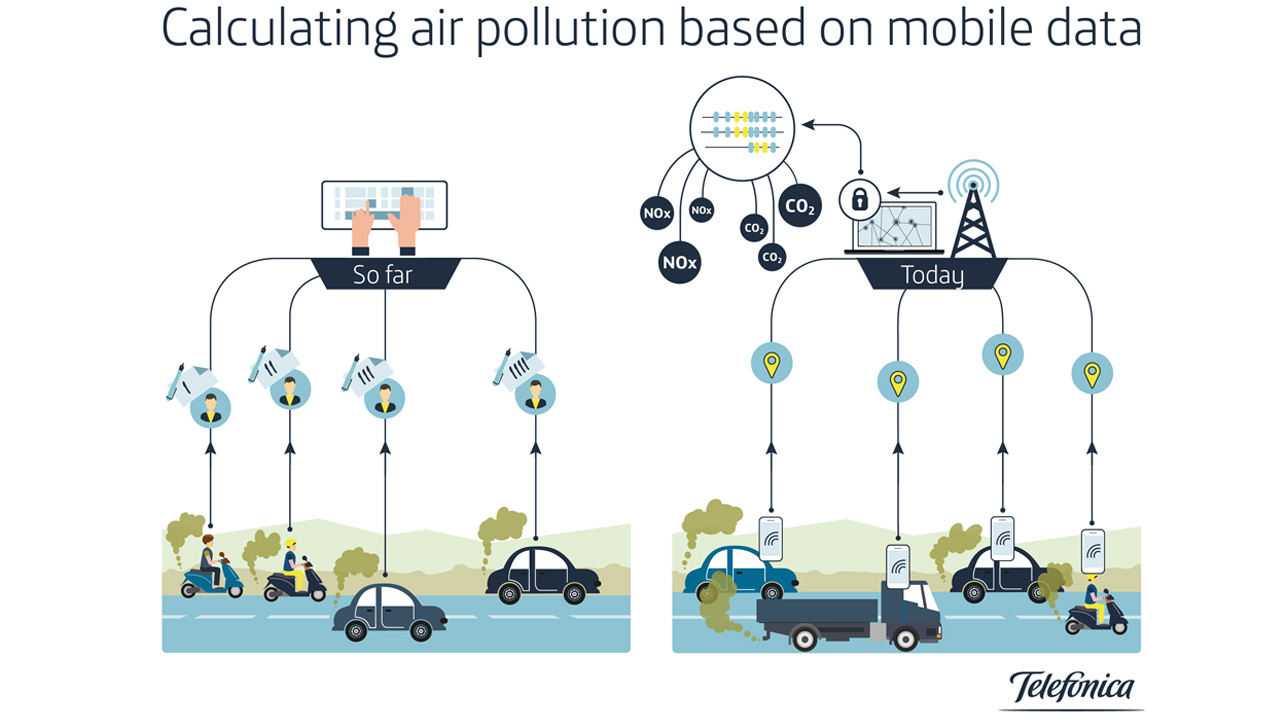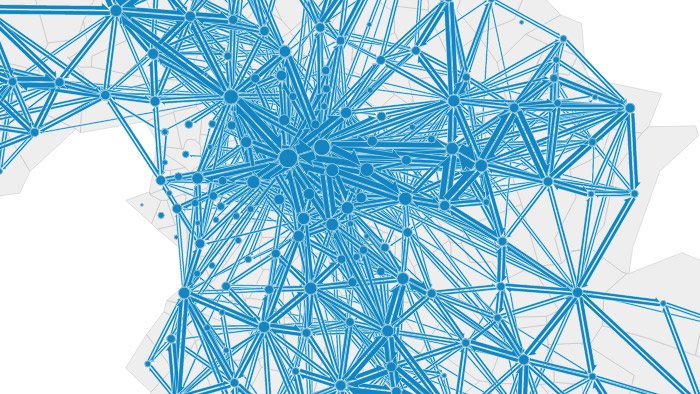04.04.2017
Pilot Project by Telefónica NEXT, South Pole Group and Teralytics:
Successful test of Air Quality Analysis using mobile network data

Large cities are faced with constantly increasing pollution. But before cities can take specific measures against this problem, they first have to know where pollution is especially high. To this end, they require extensive data. As part of a pilot project in Nuremberg, for the first time, a method was developed that enables the analysis of traffic flows, and subsequently of air quality, using anonymised mobile network data. The approach is promising, which is why the methodology will be further developed in a follow-up project. This means cities will soon have new options for fighting smog.
The project is a collaboration between Telefónica NEXT, the sustainability solutions expert South Pole Group, the data analysis expert Teralytics and the city of Nuremberg. The project is sponsored by the Low Carbon City Lab (LoCaL), an EU programme by Climate-KIC.
The basis of the research is the data that is generated in large quantities by the normal business processes of Telefónica Deutschland. That occurs when mobile phones communicate with mobile cell sites, when using the internet or making calls. Through “Advanced Data Analytics”, Telefónica NEXT is developing ways for this data to benefit societies and economies while remaining fully protected.
Potential of Mobile Network Data for the Analysis of Emissions
The method tested in Nuremberg, based on anonymised mobile network data, meaningfully complements previous measurement methods, since the extensive data is available around the clock and nationwide. Furthermore, the assessment are more cost-effective, since they require no additional stationary technology or personnel to monitor traffic. This offers new opportunities to increase the accuracy and impact of current methods.
Through the comparison with existing measurement values from Nuremberg, the accuracy of the method was well examined. For instance, it was revealed that the air quality measured by stationary measurement stations in Nuremberg city centre matched that obtained from mobile network data calculations.
“We are very interested in improving the air quality in our city of Nuremberg and are very open to new methods to achieve this. Accordingly, we were very pleased to support this research project as a pilot city. Especially relevant for us are the findings as to how we can situationally better manage traffic. The findings obtained as part of the pilot project could lead to a realistic assessment of such regulation mechanisms. Additionally, further research efforts are planned to be geared towards the examination of traffic-minimising measures. We will continue to eagerly follow the development of further research with mobile network data”, says Dr Peter Pluschke, City Councillor and Head of the Department for Environmental Policy and Health.
From Mobile Network Data to Pollutant Values

The basis of the research was mobile network data generated in August and September 2015 in the Telefónica Deutschland network. Using a three-level, TÜV-certified process, said data was fully anonymised; all personal information has been removed.
The data analysis expert Teralytics transformed the data into mobility flows using their unique algorithms, thus identifying over 1.2 million routes. The sustainability solution expert South Pole Group then used a dispersion model to model the pollution levels, doing so by taking into consideration information on pollutants from individual traffic carriers from the Federal Ministry for the Environment and meteorological data.
“Approximately 70 percent of global greenhouse gas emissions are generated in cities, meaning that they play a key role in climate protection. We see great potential in the use of daily generated data, such as mobile network data, to reduce pollution levels in cities. Data-based analyses and innovative measures can contribute to even more efficient support for cities in future for the implementation of their ambitious climate and clean air objectives”, states Renat Heuberger, CEO of South Pole Group.
Maximilian Groth, Business Developer at Teralytics, adds: “Algorithms often appear very abstract. This joint pilot project shows how, with the help of data and algorithms, real social issues and challenges can be tackled”.
Further Development of the Methodology
Following the successful conclusion of the pilot project in Nuremberg, the research team will expand and improve the methodology in a second research project in order to improve the accuracy of the results. This project will also be sponsored by the EU programme Low Carbon City Lab.
Victor Gancel, Programme Manager of the Low Carbon City Lab (LoCaL) of Climate-KIC: “We are pleased that the pilot project has provided such extensive data. We want to continue to financially support the project, thereby contributing to helping cities improve their air quality in a targeted manner in future”.
For instance, short routes of less than two kilometres are to be included in more detail in the analysis. This will allow a better distinction between individual means of transportation in future, thus giving a more precise picture of the overall traffic volume. This would make it possible, for instance, to make statements on the impact of logistics and transportation companies on the pollution levels of a city. Furthermore, the vehicles used vary by city. In some, the share of SUVs is higher, in others, electric cars are more frequently used. By taking the above mentioned additional factors into account and further improving the accuracy of the approach, the service might be used to quantify the impacts of large events or interventions on the emission levels of a city in the future.
Anonymized mobile network data from Telefónica Deutschland also help traffic planning. This was confirmed by the Fraunhofer Institute for Industrial Engineering (IAO) in a study entitled “Potential of Mobile Network Data for Traffic Planning” published in February.
The utilisation of data for business and social solutions is a global aim of Telefónica S.A. in the business area called “LUCA” and is realised in various countries using different products. With Telefónica NEXT, Telefónica Germany is creating solutions for the needs of the German market, for example with an anonymisation process developed in-house.